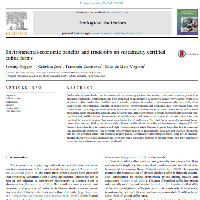Resumen
-
Coffee with diverse shade trees is recognized as conserving greater biodiversity than more intensive production methods. Sustainable certification has been proposed as an incentive to conserve shade grown coffee. With 40% of global coffee production certified as sustainable, evidence is needed to demonstrate whether certification supports the environmental benefits of shade coffee. Environmental and economic data were taken from 278 coffee farms in Nicaragua divided between non-certified and five different sustainable certifications. Farms were propensity-score matched by altitude, area of coffee and farmer education to ensure comparability between non-certified and certified farms. Farms under all certifications had better environmental characteristics than non-certified for some indicators, but none were better for all indicators. Certified farms generally received better prices than non-certified farms. Farms with different certifications had different investment strategies; C.A.F.E. Practice farms had high investment and high return strategies, while Utz and Organic farms had low investment, low productivity strategies. Tree diversity was inversely related to productivity, price and net revenue in general, but not for certified farms that received higher prices. Certification differentiates farms with better environmental characteristics and management, provides some economic benefits to most farmers, and may contribute to mitigating environment/economic trade-offs.
